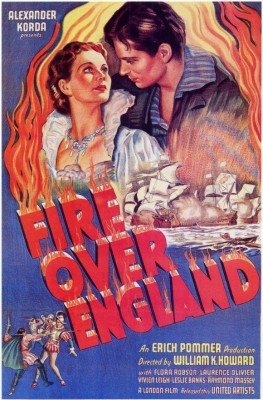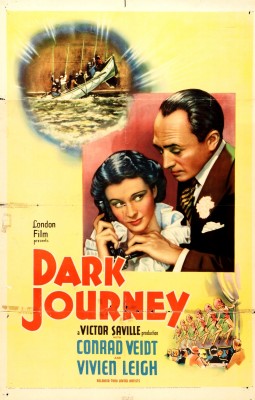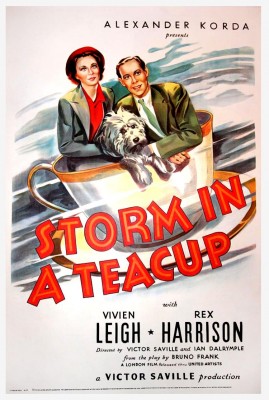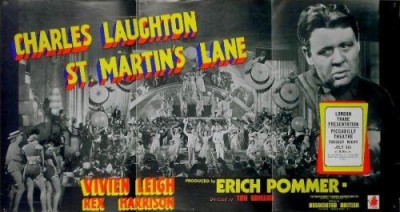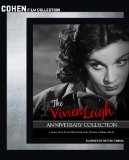| Reviews & Columns |
|
Reviews DVD TV on DVD Blu-ray 4K UHD International DVDs In Theaters Reviews by Studio Video Games Features Collector Series DVDs Easter Egg Database Interviews DVD Talk Radio Feature Articles Columns Anime Talk DVD Savant Horror DVDs The M.O.D. Squad Art House HD Talk Silent DVD
|
DVD Talk Forum |
|
|
| Resources |
|
DVD Price Search Customer Service #'s RCE Info Links |
|
Columns
|
|
|
Vivien Leigh Anniversary Collection, The
The films, all shot on 35mm black and white, nitrate film stock, are touted as 2K restorations by distributor Cohen Media Group, in association with the British Film Institute. However, I found all four video transfers problematic to various degrees. Basically, each film has been heavily processed through digital cleanup programs to the point where, while the films now appear completely free of damage and wear, they no longer resemble motion picture film at all. At worst, they closely resemble something like a kinescope of a live television broadcast from the 1950s. At times the image isn't so much black-and-white as dull gray. Everything is soft and washed out. This is especially noticeable on all process shots. Any time there's a dissolve the image inexplicably becomes extremely out-of-focus, as if the cleanup program can't quite process the gradual transition between images.
This is most distracting on Fire Over England. On that film even its titles have obviously been unnaturally tinkered with while its climax, featuring the Spanish Armada in miniature, is a murky, dreary mess. While I understand on that film particularly surviving elements were in extremely poor shape, the results just look wrong.
I'd much rather see a good, straightforward transfer of best-surviving film elements (something many niche Blu-ray labels are forced into owing to budgetary limitations) than to over-manipulate what survives into a damage-free transfer that no longer resembles 35mm film. The extent of this varies from film to film (Dark Journey suffers least) but at various levels all four films have been impacted.
Based on A.E.W. Mason's novel, Fire Over England was the Vivien Leigh movie agent Myron Selznick saw which led to her eventual casting in brother David O. Selznick's gargantuan production of Gone with the Wind. The movie is a pretty good historical drama that compares favorably to more recent films and miniseries covering Elizabeth I's reign, particularly the 2005 miniseries of Elizabeth I starring Helen Mirren. Both are witty, intelligent, with an authentic air generally lacking in Hollywood films about historical England.
Fire Over England focuses on the imminent threat from Spain and her vastly superior Armada amid strained relations between the two superpowers of the late 16th century. Laurence Olivier (Leigh's future husband) stars as Michael Ingolby, an Englishman who flees Spain after his father's ship is captured and the father executed as a heretic.
Hillary Vane (James Mason, in a small but not uncredited role, as many sources, including the Blu-ray's own liner notes, report) is an Englishman spying in Elizabeth's court on behalf of King Philip II (Raymond Massey). When Vane is killed trying to leave the country the Queen (Flora Robson) compels Michael to impersonate Vane in order to secure letters plotting her assassination.
Leigh has a relatively small role as Michael's lover, Cynthia, a lady-in-waiting who's also the granddaughter of Robert Dudley, Earl of Leicester (Leslie Banks), the Queen's most devoted advisor. Though Olivier clearly is playing the leading role, the picture is almost an ensemble piece, with Flora Robson's Elizabeth I one of the very best performances, and a part she'd famously reprise in The Sea Hawk (1940). Indeed, good performances abound, from Banks's "Robin," to an atypically restrained and subtle Robert Newton as Don Pedro.
Despite inadequate special effects miniatures that look like something out of cheap serial, the film otherwise is quite lavish, perhaps a bit too lavish for its own good. (This problem is even more pronounced in Storm in a Teacup, another London Films production.) It's interesting, certainly, to compare this film's settings to the Elizabeth I miniseries, which more accurately placed the court in dark, paneled, modest rooms as opposed to Fire Over England's opulent and cavernous sets (and glass shots). (***1/2 out of *****)
Dark Journey is a pretty clever World War I spy film-romantic melodrama, with Leigh and Conrad Veidt as secret agents on opposite sides who eventually fall in love.
Near the end of the war, in the spring of 1918, Madeleine Goddard (Leigh) poses as a Swiss dress shop owner spying for the Germans. (Emphatically not the Nazis, as TCM's site reports.) Cleverly, the fancy women's wear she ships between France and her shop in Stockholm via Dutch freighters incorporate patterns that, when aligned with identical patterns in Sweden, reveal troop positions and other vital secret data. However, it's soon revealed that Madeleine in fact is a French double agent trying to locate Germany's new man in Stockholm.
When suave Baron Karl Von Marwitz enters the country, the answer becomes obvious, at least when the role is played by Conrad Veidt. The dandy Baron pretends to be a moneyed deserter; this convinces Stockholm's expatriate Germans but not the movie audience. A notorious womanizer, he eventually gets around to wooing Madeleine in her dress shop, where the Baron treats his parade of admirers to expensive gifts. Gradually, as they fall in love, they realize the predicament they've placed themselves in. Can their love survive?
Those who know Veidt primarily for his memorable villains, in The Thief of Bagdad (1940) and Casablanca (1942), among others, may be surprised to see him play such a believably charming and humanist rogue. Where Leigh is merely the intelligent and dedicated agent, Veidt projects a weary worldliness in his character, and there's an almost startling contrast between the character he plays for most of the film (the deserter Baron) and the agent he finally reveals toward the end.
Dark Journey is a somewhat strange viewing experience. Partly it's a bit confusing, what with Leigh playing a Swiss pretending to spy for Germany but actually France on a Dutch freighter bound for Sweden. Visually, the movie is also rather disorienting: though set in 1918 all of the women's fashions, including everything at Madeleine's dress shop, are completely modern, a twenty-year anachronism.
But the short (77 minutes) film moves at a brisk pace, its espionage machinations are inventive and interesting, and Veidt makes the film well worth watching. (***1/2)
Storm in a Teacup is something like an antecedent to the subtly charming little social comedies made famous by Ealing Studios in the late 1940s and early ‘50s. This one has a lot of promise but much of its potential charm is lost in its notably inauthentic depiction of Scottish life and due to overproduction.
In the Western Scotland port city of Baikie, reporter Frank Burden (Rex Harrison) watches as local police seize elderly Honoria Hegarty's (Sara Allgood) mutt Patsy for non-payment of a dog license. Later, when Frank interviews pompous, ambitious (and British) Provost Willie Gow (Cecil Parker) Honoria shows up at Willie's doorstep, begging clemency for the animal, but he brusquely dismisses her, all the while bragging to Frank about being a man of the people.
Frank changes his story to report on Willie's callousness, causing a scandal. In a funny scene at a political rally, Willie's important speech is interrupted by jeers from the audience, who imitate dog barks, and pandemonium erupts. Meanwhile, Frank's budding romance with Vickie Gow (Leigh), Willie's daughter, is threatened by the damage Frank has done to her father's career, she torn between sympathy for Honoria and her dog, and her father's reputation.
The witty script by co-director (with Victor Saville) Ian Dalrymple and Donald Bull, adapted from James Bridie's play that in turn was adapted from a German original by Bruno Frank, suffers from overproduction and location inauthenticity. This view may be colored by the many better gentle Scotland-based social satires that have come since, notably the films of Scottish writer-director Bill Forsyth (Local Hero, Gregory's Girl, etc.).
Storm in a Teacup rivals Fire Over England in terms of opulence. Elizabeth I would have felt right at home in Willie Gow's home and office, while the droll courtroom climax is threatened by the distraction of its humungous set and scores of extras. Baikie is referred to as a "small Scottish town" but that courtroom makes the Old Bailey look like a water closet.
Recreated on soundstage sets, the film is lacking the intended Scottish atmosphere, and most of the cast, few of whom are natives, affect inauthentic accents or don't even try. (Leigh and Parker are English but it's not clear if Harrison is supposed to be Scottish or a transplanted Londoner. He talks a bit strangely, like Henry Higgins after dental surgery.)
But Storm in a Teacup is a modest success, funny in spite of its shortcomings. Leigh, in a resolutely supporting part, is stuck with a somewhat unsympathetic role. (*** 1/2)
St. Martin's Lane, released in the U.S. as Sidewalks of London is, again, less notable for Leigh's performance than for other reasons, mainly its depiction of buskers, street performers in London's Piccadilly theater district who'd entertain audiences as they waited outside in line. Producer/co-writer/star Charles Laughton engaged the services of real buskers in some of the supporting roles, lending the film verisimilitude, and Laughton himself delivers a memorable characterization.
Vivien Leigh plays Libby, an aspiring dancer making ends meet through pickpocketing. Charles Staggers (Laughton), a barely-surviving but outwardly-content street entertainer, catches her stealing a gold cigarette case from celebrated songwriter Harley Prentiss (Rex Harrison again), steals it back and returns it to him, insisting that he not be compensated for his trouble. Charlie puts Libby up in his small flat and, sensing her talent, takes her on as his apprentice.
The film anticipates All About Eve slightly, as she uses Charlie, Harley, and others to further her own career while expressing contempt for busking and is generally oblivious to Charlie's obvious growing love for her. She rises up the show business ladder (mink coat, Hollywood contract) while he descends into alcoholism.
Though self-conscious and overly theatrical at times, Laughton gives a mostly outstanding performance as the tragic busker whose specialty, a recitation of Rudyard Kipling's If, is at once heartfelt and embarrassing.
The use of real buskers such as The Luna Boys is both fascinating and poignant, the film itself acknowledging that the profession reflects a bygone facet of British life, one gradually fading against a modernizing, less tolerant London. And this time the opulence of the production pays off: most of the exteriors are filmed on a massive backlot recreation of St. Martin's Lane, a forced perspective set complete with moving cutout vehicles in the distance where the street ends. (****)
Video & Audio
The Vivien Leigh Anniversary Collection's video transfers are distractingly flawed for reasons described in more detail above. At their best they look just okay, at least approaching a genuinely film-like appearance, but too often the digital cleanup merely distracts from enjoying the films to their full potential. There are two full-frame, black-and-white films per disc. The LPCM mono audio, English-only, is also just okay and the films are not supported by subtitle options.
Extra Features
The main extra is a booklet essay by Kendra Bean, author of Vivien Leigh: An Intimate Portrait. It provides useful information mainly putting Leigh's career at the time into context. Original trailers to all but St. Martin's Lane are also included.
Parting Thoughts
Not so much a showcase of Leigh's talents as a sampling of top-tier British filmmaking in 1937-38, The Vivien Leigh Anniversary Collection is a release damaged by over-processed "restoration" work and therefore only moderately Recommended.
Stuart Galbraith IV is the Kyoto-based film historian and publisher-editor of World Cinema Paradise. His credits include film history books, DVD and Blu-ray audio commentaries and special features.
|
| Popular Reviews |
| Sponsored Links |
|
|
| Sponsored Links |
|
|
| Release List | Reviews | Shop | Newsletter | Forum | DVD Giveaways | Blu-Ray | Advertise |
|
Copyright 2024 DVDTalk.com All Rights Reserved. Legal Info, Privacy Policy, Terms of Use,
Manage Preferences,
Your Privacy Choices | |||||||









